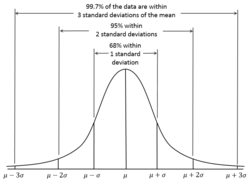700 Followers Problem!
 Expanding
(
1
+
0
.
2
)
1
0
0
0
by the
Binomial theorem
gives
Expanding
(
1
+
0
.
2
)
1
0
0
0
by the
Binomial theorem
gives
( 0 1 0 0 0 ) ( 0 . 2 ) 0 + ( 1 1 0 0 0 ) ( 0 . 2 ) 1 + ( 2 1 0 0 0 ) ( 0 . 2 ) 2 + ⋯ + ( 1 0 0 0 1 0 0 0 ) ( 0 . 2 ) 1 0 0 0 = A 0 + A 1 + A 2 + ⋯ + A 1 0 0 0
Where A k = ( k 1 0 0 0 ) ( 0 . 2 ) k for k = 0 , 1 , 2 , … , 1 0 0 0 .
For which k is A k the largest?
I Thank all my followers!
Image Credit: Wikimedia Empirical Rule by Dan Kernler
The answer is 166.
This section requires Javascript.
You are seeing this because something didn't load right. We suggest you, (a) try
refreshing the page, (b) enabling javascript if it is disabled on your browser and,
finally, (c)
loading the
non-javascript version of this page
. We're sorry about the hassle.
3 solutions
Wouldn't say a level fiiiiive problem dude!! ...
@Pranjal Jain , note that the bounds of your solution are wrong.
k + 1 1 0 0 0 − k > 5 ⟹ 6 k < 9 9 5 ⟹ k < 1 6 5 . 8 3 3 ⟹ k + 1 < 1 6 6 . 8 3 3
which implies (from the first statement of your solution) that A k + 1 is strictly increasing till k + 1 = 1 6 6 or that A k is strictly increasing till k = 1 6 6 and as such, we have, sup ( { A k } ) = A 1 6 6 .
Edit your solution accordingly and correct the bounds. Otherwise, it seems that the value of k is unbounded above which is false.
Is this not a highly over rated sum??Perfect for level 3 ..... even over rated for level 4 too...
I would like to share a generalised solution for these type of questions.
In the expansion of ( 1 + x ) n , the greatest term is r.
Where r = [ p ] + 1 ( w h e r e [ . ] s t a n d s f o r G . I . F ) , if p is not an integer and r = p & p + 1 if p is an integer.
N o t e , p = 1 + x x ( 1 + N )
In given question x = 0 . 2 & n = 1 0 0 0
therefore [ p ] = [ 1 . 2 0 . 2 ( 1 0 0 1 ) ] = 1 6 6
hence 1 6 7 t h term is the greatest.
so, i n A k k = 1 6 6 . ( s i n c e s e r i e s s t a r t s f r o m A 0 )
from where did you learn that
Log in to reply
I have generalized it by observing the results of these types of questions by myself. later on i came to know that this result is really used in some books.
Log in to reply
great consequence of your observations Keep it up dude !!!
Good observation...Keep it up!!!!(+1)
These sums are meant to be done manually....and pls post solutions using mathematics...the topic is 'ALGEBRA' not 'COMPUTER SCIENCE'.
A k A k + 1 > 1 ⇒ ( k 1 0 0 0 ) ( k + 1 1 0 0 0 ) × 0 . 2 > 1 ⇒ k + 1 1 0 0 0 − k > 5 ⇒ k < 1 6 5 . 8 3 3
Therefore, A 1 6 6 > A 1 6 5 but A 1 6 7 ≯ A 1 6 6 . Thus, maximum is A 1 6 6